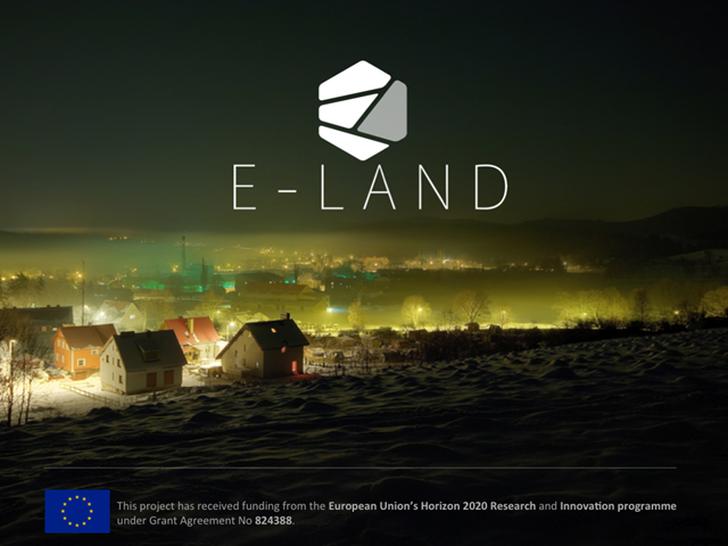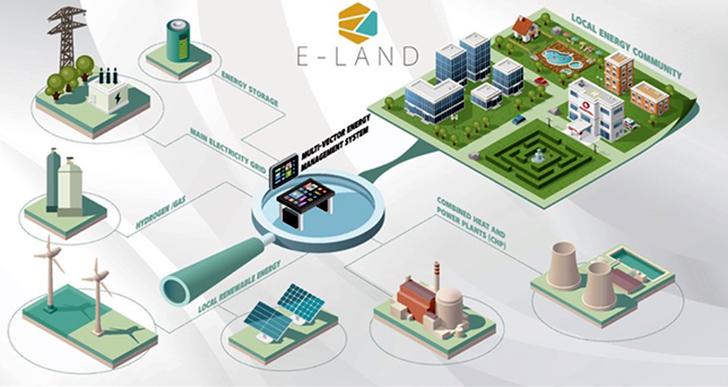Gabriel Souca
Vicepresident CREESC
General Manager Energo ESCO
The Centre for Resources in Energy Efficiency and Climate Change from Cluj-Napoca together with Valahia University of Targoviste are proud partners in E-LAND – a strategic research & development EU HORIZON 2020 project with a total value of 6 million EUR.
The project will develop integrated sustainable solutions for energy prosumers – producing, storage, delivering of energy – related to challenging ecosystems of specific isolated or other community areas – campuses, industrial parks or rural areas.
According to European Commission, energy islands represent existing standalone consumers that are not connected and lack interconnections to achieve full optimization. Currently, such networks are optimized and operated separately. Past research has shown that integrated optimization of these networks leads to higher renewable energy integration in all networks, and to lower costs and higher reliability. To obtain these optimization benefits, a smart management tool is needed – which does not yet exist in the market and this is what E-LAND aims to achieve.
E-LAND will take place in 3 Test & Demonstration real-life pilots across Europe:
- The Industrial Harbor – Port of Borg, Norway
- The University Campus – Valahia University of Targoviste, Romania
- Technology Park: Walqa Technology Park, Spain
A major element of the project is the synergy between the project partners – 12 different entities from 8 European countries with diverse expertise and specific cultural elements:
- Smart Innovation Norway – SIN, Norway
- Schneider Electric Norge, Norway
- Borg Havn, Norway
- Institute for Energy Technology, Norway
- VaasaETT Ltd Ab Oy, Finland
- University of Girona, Spain
- Intracom SA Telecom Solutions, Greece,
- Reiner Lemoine Institute, Germany,
- Valahia University of Targoviste, Romania
- CREESC – Association Center for Resources in Energy Efficiency, Romania
- University of St. Gallen, Switzerland
- Instrumentacion y componentes, Spain
In addition, as a global impact of the project, through a separate collaboration agreement, one partner from India, BSES YAMUNA POWER, is included in the program.
CREESC’s role in this strategic project is to analyze and make available for the research group information from the energy market in Romania to support the quality of the project development process and to adapt the integrated solution for the Eastern European market. At the same time, CREESC will communicate and disseminate the evolution of the project and its results to energy and sustainability market stakeholders in Romania.

CREESC reunites companies and experts from a wide range of energy and sustainability related sectors, such as ESCOs, construction companies, building services, climate change experts, architects & urbanists, environmental economists, energy financiers. We work closely with the academia and the local public authorities, providing a thriving environment for dialogue, cooperation, partnership, integration and learning among all stakeholders it interacts with. Our mission is to provide all the necessary means, in terms of resources, capacities and expertise, in order to accelerate investments in the private and public energy efficiency markets and make use of dedicated funding sources.
Our Romanian partner in the E-LAND project, the Valahia University of Targoviste has a unique infrastructure at a national level with 35 research laboratories that are in interdependence, allowing the development of a multidisciplinary research activity. It was designed from the beginning to integrate active energy elements from RES, all present in and around a NZEB building.
Within the E-LAND project, Valahia University of Targoviste is expected to deliver outputs around the development of an EMS at the level of the entire campus and the interconnection of BMS / BACS with the new EMS at the research institute building.
Several scenarios will be implemented:
- optimization of electrical and thermal energy storage
- conversion of electrical surplus into thermal
- implementation of consumption prediction algorithms
- implementation of algorithms for predicting energy production from RES
- optimization of the energy flow at the local energy system level
E-LAND expected results, based on pilot scenarios implementation, forthcoming communicated and disseminated by CREESC are:
- sustainable model for inducing change in communities about energy behavior
- a Stakeholder Innovation Group was developed in the last months, with the participation of Romanian stakeholders as well (ANRE and Servelect).The objective is to gather a group of stakeholders external to the project that will assist in magnifying the impact of the E-LAND innovations.
- policy assessment and recommendations
- replication guidelines
- business models and exploitation plan
As a personal touch for this article, I believe the main benefit for the local communities, gathered from the dissemination of the project results can be the change of paradigm for the worldwide energy-related solution providers (electricity, gas, equipment, software etc.). In this moment, the providers are only focusing on their business model without taking into account the interoperability and data integration. Projects like E-LAND have the big opportunity to disrupt the energy market worldwide by inter-connecting in a symbiotic manner all aspects related to energy: electricity or gas delivery, microgrids, lighting, photovoltaic panels, equipment producers, BMS systems and so on. The main obstacle we foresee in this moment is related to the data integration and sense-making of the obtained data but we are sure that CREESC, together with other experts from various sectors, will manage to overcome.

Disruptive innovation is a concept that we try to put on the table in the E-LAND project and we strongly believe that the results obtained together with the Valahia University of Targoviste will become the first pillar of the interconnectivity of all various market segments related to energy by placing in the middle of the interests the unknown energy islands.
In the context of the current CO-VID 19 crisis, various industries will dramatically change. The work from home concept will be embraced by a lot of companies and this will change the consumption habits also in terms of electricity. Setting up sustainable energy islands by using the data obtained from the E-LAND project could become an opportunity for the future energy market by developing new business models.
